-
MEMORIES TO CHOKE ON, DRINKS TO WASH THEM DOWN (Leung Ming-kai, Kate Reilly 2019)
LEUNG MIND-KAI, KATE REILLY: MEMORIES TO CHOKE ON, DRINKS TO WASH THEM DOWN 夜香‧鴛鴦‧深水埗(2019)
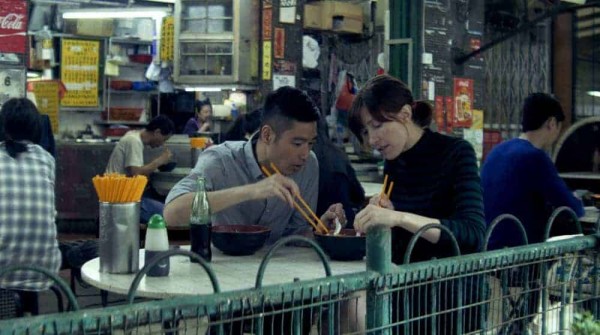
GREGORY WONG AND KATE REILLY IN MEMORIES TO CHOKE ON, DRINKS TO WASH THEM DOWN
A collection of segments set in Hong Kong fails to engage
This is an odd collection of shorts with a Hong Kong setting and a wealth of opportunities not quite seized.
1. "Forbidden City." An old woman with mild dementia spends a few hours with her pretty new Cantonese-speaking Indonesian caretaker who consents to take her on a bus trip ("Forbidden City" because she's not supposed to go out), knowing that if they ride around in a circle her charge will not know the difference and will think they're been on an outing. This seems to be about the repetitious dialogue. We feel for the caretaker who has to listen to the same stories five times in a couple of hours. Greater humor and greater poignancy in the writing were needed; the two actors are fine.
2. "Toy Stories" focuses on two brothers in the Japanese toy shop of their mother. The information they exchange about various toys is quite precise. Each toy refers to an experience of their childhood or an aspiration of their adulthood. But the main interest is the sudden revelation that the younger brother has lost his job and would like to take over the store but has just learned she wants to turn it over to somebody, and he hasn't told her about his situation.
3. "Yuen Yeung." A female American English teacher and her local math teacher male colleague meet regularly to eat Hong Kong food, and Kentucky Fried Chicken, and drink (Yuen Yeung is a coffee-tea mix with a local labor history connection). This could be a low-keyed romance about shyness, frustration, and disappointment - if the writing were better and the acting more expressive. This seems a collection of narrowly missed opportunities for greater humor and warmth.
4. The oddest segment and most unexpected, since it's a documentary. It cuts back and forth somewhat confusingly between campaigning and personal moments as Jessica Lam, a young Hong Kong barista and cat fancier of and also someone running in the city election in 2019 - one in which, we are told by story cards, the DAB Pro China party lost big. But we are shown that Jessica, though ostensibly on the winning side, herself lost, if by only 102 votes. We learn that she not only likes cats in some sense doesn't like people - or at least doesn't care to have them sit close her at the bar. She also tells us she didn't want to serve on the political committee much anyway. Two videos by Teenage Riot are inserted in this segment in which Jessica appears. There is some information about Hong Kong politics in this segment, obviously, but it seems confusingly edited and lacks depth.
Each of these segments has strong story possibilities that, in a revised or expanded form, might have emerged. In the present form however they are underwhelming.
Memories to Choke on, Drinks to Wash them Down, 77 mins., presented by Golden Scene Co. Ltd, was an extra at the 2020 all virtual NYAFF.
Last edited by Chris Knipp; 09-03-2020 at 12:30 PM.
-
DETENTION 返校 (John Hsu 2019)
JOHN HSU: DETENTION 返校 (2019)
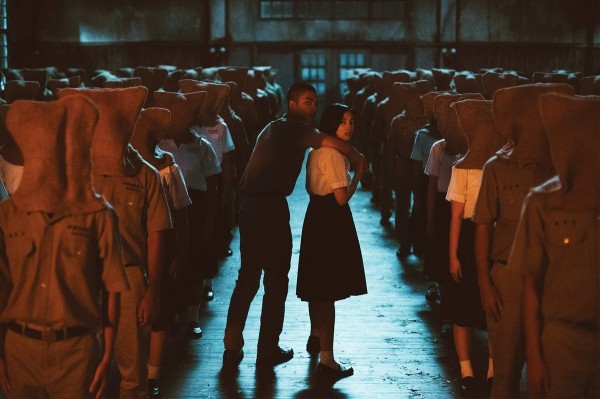
An elegantly filmed videogame of a moment in Taiwan's repressive 1960's
This film is set in 1962 during Taiwan's long nightmare of government repression, a period when hyper-vigilance against communist infiltration dominated national daily life. Two students are trapped at the hillside Greenweood High School at night. Trying to escape, they discover a missing teacher and run into ghosts and what the Wikipedia article calls "the dark truth of their fate." Detention, strangely enough, is based on a videogame described as a "survival horror adventure." Knowing that makes things a lot clearer.
That medium seems a strange entree into the rarely depicted "White Terror" period of the Kuonmintang regime of repression in Taiwan when thousands were executed. It leads to a rather strange combination of the elegant and the crude - but elegant prevails and this film won a raft of awards in Taiwan. As a depiction of an historical moment, it's odd to see the horror movie style used. On the other hand, this is a classy horror movie, one that's never really frightening, but with awfully good-looking young men and women representing students repressed for a book club presided over by two dissident teachers (reading Turgenyev's Fathers and Sons - a very serious offense), a striking sound design (too loud, in the horror movie manner, but still subtle by horror movie standards) and a nicely recorded score of strings and piano by Luming Lu and handsome cinematography by dp Chou Yi-Hsien. The choice has been made to depict the horror of government repression as a horror movie, but a tasteful one. This is a handsomely made movie, but ultimately not a very interesting one by the standards of films about repressed students and spooky government oppressors.
In the film's favor, it's banned in mainland China. It "enjoyed strong box office success in Taiwan and Hong Kong (Wikipedia). On the other hand, it doesn't seem likely to arouse much excitement among western viewers. Those in search of historical truth will find events dealt with too impressionistically. Genre horror fans will find it too restrained and tasteful. Some young men are dunked head first into vats of water. One gets his throat slit by a young woman. There are a couple of executions by bullet. There is some intimidation. The best scenes are those at the beginning when students are meeting clandestinely and being found out.
Really there don't seem to have been a wealth of ideas about how to vary scenes. Many of them involve young men (with nice eyebrows, casting seemed to favor those) in khaki shirts and pants being marched or pushed around, or given the head-dunking treatment. The staging is dark and grand, rather than bright and intimate, where in might have been more scary.
In her Variety review Jessica Kiang notes that the "White Terror" period has been little depicted in film, that the Taiwanese would rather forget it (but those who forget risk repeating). An exception is Hou Hsiao-hsien’s 1989 A City of Sadness and Edward Yang alludes to it in his 1991 autobiographical masterpiece A Brighter Summer Day. Hsu's Detention is meant to be what Kiang calls a more "populist" and less "arthouse" approach. It's extraordinary to learn that The White Terror period lasted over 38 years, staring in 1947 and ending in 1987. That's a lot to forget.
It winds up being an "ambitious, but not entirely successful" mashup of "haunted-house horror," of "monster movie" of "love story," and "historical reckoning" or "sentimentalized call" for national reckoning. At best it probably couldn't do all that. The videogame source accounts for an effective theatricality, but also thin characterizations and a sense that events are mechanically predetermined rather than natural. But after all, the whole thing is intentionally surreal in style.
The dissident teachers are led by Miss Yin (Cecilia Choi) and Mr Zhang (Fu Meng-Po), who pass out the banned books to the nice looking young men/boys and women/girls. As Kiang puts it their discussion sessions are "bathed in a honeyed nostalgic glow", which leads us to expect a standard glossy historical film. Then suddenly the film morphs into a nightmare where the school is transformed into a wasteland with monsters and torture, with a network of flashbacks depicting the book club's betrayal, and the repression - arrests, torture and executions - that followed, as well as details as to Miss Fang's troubled home life and relationship with Mr Zhang, Finally in the action "rather cleverly," Kiang thinks, "it’s revealed just who is doing the dreaming of this hellish place, what their real mission is and how it relates to the history of the White Terror and the fog of willful amnesia in which it has been shrouded." That's a large order, and some of it was lost on me. Multiple viewings might be necessary. But since this lacks the breath of real life one doesn't feel highly motivated, though this is, in its way, a beautiful film to look at and listen to, without question.
Deterntion 返校 ("Back to School"), 102 mins., debuteed at Busan Oct. 2019, showing also at Taipei Golden Horse, Taipei, and Miami. At Golden Horse it won seven major awards and was nominated for five more. Screened for this review as part of the 2020 virtual New York Asian Film Festival (Aug. 28-Sept. 12).
Last edited by Chris Knipp; 09-03-2020 at 02:13 AM.
-
KIM JI-YOUNG: BORN 1982 82년생 김지영( Kim Do-young 2019)
KIM DO-YOUNG: KIM JI-YOUNG BORN 1982 / 82년생 김지영 (2019)
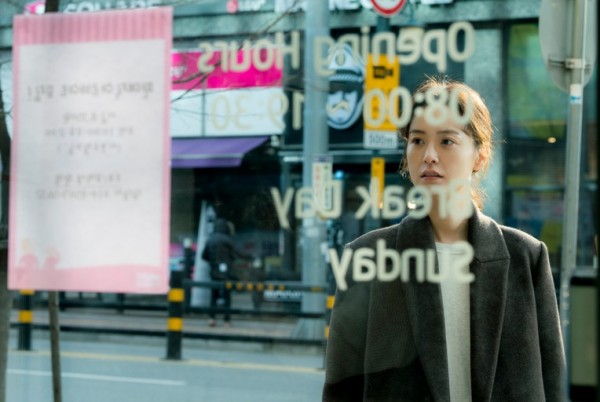
JUNG YU-MI IN KIM JI-YOUNG: BORN 1982
A well off young woman seen as a victim of ingrained misogyny in Korean society
Kim Ji-young Born 1982 is a conscientious issue picture. It's about female discontent and unfair male dominance even in upper middle class contemporary Korean society, and is based on the eponymous bestselling semi-autobiographical novel about a typical young woman: "Kim Yi-young" is like "Jane Doe" in Korean. These basics could not be more clear, and are familiar from other societies where situations and feelings are quite similar. In the film, the details - which it's said have aroused strong arguments or even caused breakups between couples in Korea - can be confusing to sort out. The film provides a sequence of scenes and flashbacks whose interrelationship isn't so easy to follow, though it is evident that despite advances, and well educated women working in executive positions, Korean society remains highly patriarchal, and older generation women can tend to reenforce that. And this is a film that obviously needs to be seen. The specifics may be elusive, the film may have failings, but the subject is so important the book has been translated into over a dozen languages.
The message may be confused by the complexity of the protagonist's situation, or just be presented confusingly. Kim Ji-young has worked at a firm where some women have - well, one has anyway - a respected position, even though the males get promoted first. She may have found this work challenging and interesting - her female boss was encouraging - or a pain in the neck. Now she is at home to care for her new baby. The rigid relationships of dealing with her in-laws at holiday time may drive her nuts. She may simply be suffering from postpartum depression. She may just be tired of being cooped up in the house all the time (and this is why she thinks of taking a part time job at a local shop. Or she may just be losing her mental stability for reasons that have nothing at all to do with her current situation. But the story's point must be that the protagonist's experience of a totally male-dominated sexist world has driven her literally mad - as an only way out.
Unfortunately, this immaculate-looking, well cast and acted film is a little opaque. It doesn't provide very many clear guidelines, particularly in indicating the chronology of scenes set at different times, and some "scene skips" are so rapid it's not clear who the new characters are. Through depicting the protagonist as largely a helpless victim, the film fails to show what's actually going on inside her, but perhaps she does not know.
Then there is the prolonged issue of Ji-young's returning to work, when her husband offers to take a year of paternity leave so she can do it, but family members balk, and she won't be able to earn as much at the same level. Kim Ji-young's husband Jung Dae-Hyun(played by the rangy, serenely authoritative and sexy Gong Yoo) becomes ambiguous in all this. It's not clear what he really wants; he may not know. He promised to help when pushing to have a baby, he makes the paternity leave offer, but then he tells Ji-young she's not well, and proves she has acted strangely.
Perusal of a Guardian review of the source book shows it is differently organized, being mostly a linear chronological account by the psychiatrist the woman goes to. This structure, the reviewer, Sarah Shin, argues, is used to convey a sense of a"claustrophobic" as well as "airless, unbearably dull world." That aim must explain the tidiness of all the interiors in the film as well, though sometimes they just feel glossy and bland.
But the film may not convey some of the author, Cho Nam-joo's points as well as the her book, or the film's subtitles may lose subtleties that are embedded in the Koran dialogue. Korean is uniquely structured in its complex linguistic distinctions among generations and status levels. When the protagonist starts speaking like her mother at the family gathering and her father-in-law is outraged, subtitles can't convey this very well. Indeed some points (quoted in the review) are made by statement, "told" rather than "shown," e.g. "The world had changed a great deal, but the little rules, contracts and customs had not, which meant the world hadn’t actually changed at all." (This is a statement quoted from the book in the Guardian review.)
The group scenes nonetheless are what work best, in themselves, even if they don't fit together into a cogent whole: they show the subtle tensions that may exist in all interactions where people aren't happy with their situation, but can't overtly show that - yet keep constantly almost showing it. The blurb for the festival presentation suggests Kim Ji-young (Yu-mi Jung) starts having visions or being possessed. But at the family gathering when her husband whisks her away, saying she's unwell, it merely seems she has spoken up out of anger and frustration. This is the kind of moment when a sense of alien family pressure seems at its most intense.
The book came out at a particularly opportune time of much heightened Korean awareness of gender inequality (see theGuardian review). Non-Korean viewers should know particularly what happened in Korea when Kim Ji-young's mother's wish of a woman president came true - the worsening gender inequality, the patriarchal authoritarianism, the scandal and ouster, the counter reaction, the new movement for a feminist consciousness. The film may be less opportune, or serve a different audience.
Euny Hong's New York Times review of the book is more blunt. She says the book shows the "banality of the evil that is misogyny," that the subject is "young stay-at-home mother driven to a psychotic break" (by that misogyny as it impacts her), and adds that this story forced her to confront her own "traumatic experiences" that she had pretended were "nothing out of the ordinary" (perhaps they weren't!). She also writes that the book became a kind oof Uncle Tom's Cabin for gender roles in Korea. She is astute and specific in highlighting details of the book's Korean dialogue that show how the accomplished and ambitious Ji-young is abused by men from childhood to the present. She likes the translator's choice of a word in the subtitles, suggesting they're well done. But as a non-Korean, one can't help feeling much of the heft and meaning of this film remain allusive. It's not entertaining and accessible to a western audience like a Hong Sang-soo film (especially when one has seen a dozen of those!).
Sarah Shin, the Guardian reviewer, ties the book in with Bong Joon-ho's Parasite. Let's hope that the social commentary here is more subtle and precise.
Kim Ji-young: Born 1982 / 82년생 김지영, 118 mins., opened in Korea in Oct. 2019, showed in the Hong Kong Asian Film Festival Nov. 2019, and opened in many other countries in Nov. and subsequently. Received a number of nominations and awards in Korea. Screened for this review as part of the 2020 virtual New York Asian Film Festival (Aug. 28-Sept. 12, 2020).
Last edited by Chris Knipp; 09-04-2020 at 10:32 AM.
-
RÒM (Tran Thanh Huy 2019)
TRAN THANH HUY: RÒM (2029)

TRAN ANH KHUA AND TRONG VAI IN ROM
Running for lottery numbers in Ho Chi Min City
Tran Thanh Huy wins the most intensely kinetic award for this film about a couple of Ho Chi Min City teenage street boys, a promising Slumdog Millionaire-esque debut whose inspiration was one of a series of shorts by the filmmaker that was a Golden Kite winner 16.30, shown at Cannes in 2013. The action here is central but its direction is immaterial. What counts is the propulsive movement and the fluid camerawork of dp Nguyen Vinh Phuc. Notably, the wide aspect ratio images are stylized by alternating left or right diagonal tilts, giving a kind of order to the chaos. Two boys are running around here, and at the end, they're still running: there's no resolution. More of a story-line is needed than this, but there is a lot of potential here, a light, comprehensive touch with urban life, if another time there is more of a script and some sequences that are allowed to breathe.
This is all about two scrawny, energetic Ho Chi Min City street boys who survive (or do they just keep in motion?) through acting as intermediaries for bookies selling numbers tickets - and finding good numbers: this is an impoverished world where, as elsewhere on an overpopulated planet, the poorest of the poor live on dreams of sudden luck, and where there is much reliance on superstition and magic. The debut-burdened customers in run-down apartment complexes - trying to ward off their housing from being demolished - beat the boys if the numbers lose and give them a nice tip if they win. Both the boys, who look underage for there 14-15-16 chronological age, yet also ageless, are engaging as well as indefatigable.
The initial focus is on Ròm (Trần Anh Khoa), who says he once got a 25USD tip. It's the most money he's ever seen. Rom was abandoned by his parents after a demolition and failed relocation scheme, but expects them to come back to pick him up. He keeps waiting, and lives by this dream. Rom soon gets a rival in the nimble, penytailed Phuc (Nguyễn Phan Anh Tú), a fast talker who also does a mean back flip of a wall, or in the middle of the street if the spirit strikes him. Phuc, who's as fleet and acrobatic as a young Jackie Chan, tries to move in on Ròm; his deviousness relies so much on speed he seems to outrun immorality. . Phuc says (is it a joke?) he adopted the name from an American client who kept losing and would say "Fuck!" ever time, which he thought sounded cool. It's one of many throwaway moments because this movie is in such a hurry it's all over in seventy-nine minutes.
As Allan Hunter notes in his Busan Screen Daily review, this action, like Danny Boyle's Slumdog, Has "a Dickensian sweep" in the way Rom's life is "measured in the characters he meets" (at whose mercy he is from moment to moment, his survival, and the way he's "constantly at the mercy of fate." But we don't have a thrilling, satisfying Slumdog plot here. Rom is brfriended by the motherly lottery dealer Mrs Ghi (Do Nhu Cat Phuong), buteverybody's out for themselves here. There are many frantic fights, especially between Rom and Phuc. There is one sequence when Phuc takes Rom on a rid on a tiny grass-lined raft. Rom's afraid to get on, for good reason. They're constantly falling off, and one shutters to think what the water is like.
The climactic action climax is a scramble where everything goes wrong, and the slum dweller customers and Rom both get cheated. There's no prize: the way to the prize is the prize. All the fun there is is in trying to get there, even if you don't. Some of the editing by Lee Chatametikool is pretty nifty in a Guy Ritchie kind of way, but even that kind of cheating survives because the vernacular realism makes almost anything seem real. Another reviewer mentions not only Boyle's Slumdog, but also City of God. But this film, for all its kinetic charm and neorealist grip on street life, doesn't have those kinds of grandeur, violence, or plot payoff.
Rom, 79 mins., debuted at Busan oct. 2019 and released theatricallyl in Vietnam Jul. 31, 2020. It was screened for this review as part of the 2020 virtual New York Asian film Festival.
Last edited by Chris Knipp; 09-04-2020 at 10:45 PM.
-
DEAR LONELINESS 致親愛的孤獨者 (Lien Chien-hung, Sunny Yu, Liao Che-yi 2019)
LIEN CHIEN-HUNG, SUNNY YU, LIAO CHE-YI: DEAR LONELINESS 致親愛的孤獨者 (2019)
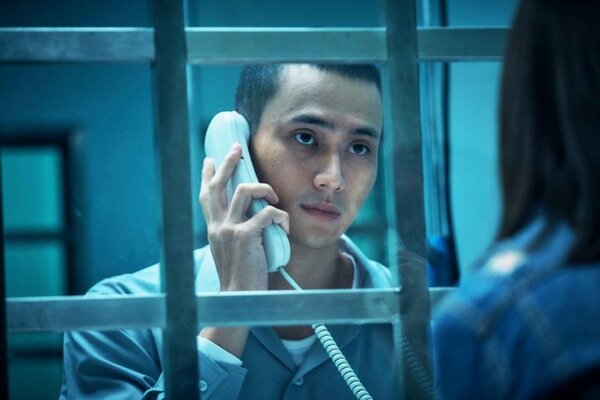
LIU KUAN-TING IN DEAR LONELINESS
Girls on their own
There is more: a TV series and a novel are tied in with these three short films about young women and sexual fantasy commissioned by a Taipei production company called Dream Image. Surprisingly, they shorts draw inspiration from a two-part documentary on 80 of Taiwan’s independent bookstores. The bookstore is in the first short and the third but only as a resting place in the second. Loneliness is a common theme, but in quite different ways. These three shorts are fine, but, being by different directors, are different in theme and feeling. If there's a common literal object, it's not so much books but cell phones. Not for that reason, or not alone for it, the three shorts' cumulative impression is very sad.
Why did the first of the three remind me of Gaspar Noé's wife Lucile Hadžihalilović? Because there's something at once extreme and creepy and sensuous and pretty about it. The girl (Lin Chi-en?), whose name Xiaoyu (Cih En Lin) is as unspellable as Hadžihalilović, doesn't look twelve, though her boy classmates do. She's a little plain, but also a seductress. Strangely, her erotic fantasies of sexy Teacher David (Chung Cheng-Chun), licking him all over, etc. have nothing to do with reality, and yet she somehow does manage to get him fired for inappropriate behavior just the same. She has little real inner life, so we don't know what she might have felt about what happens. The other teacher is a monster. He gives Chinese poetry a bad name. His screaming commands are hysterical. The girl Xiaoyu is very sly. What is she doing on the smartphone she steals and hides in the bathroom, with its Turkish-style toilet seen from high above? This is a strangely tense and economical piece and a reminder that depictions of school life are one of the best ways to make films about weirdly warped and frustrated human behavior. This is an excellent short film and its mix of fantasy and reality is just right.
Second short's girl establishes more sense and control. She arrives in town with pink daypack and roller-blade suitcase with simple questions. "Where is the girls' dorm?" "Is this room 2019?" Her name is easy: Chan Kai Han (Angel Lee). This is a tale of alienation and bureaucratic hassles and Chinese meanness that is first Kafkaesque and then violent and finally bitterly ironic. Wow! Another excellent short film that's sure to leave memories. Imagine going away to college and when you get there, they have no room for you, and your parents blame you for it. A very sardonic world vew is here.
Third and longest short focuses on Xun or Hsun (Janine Chang or Chang Chun-ning or Ning Chang or Zhang Jun-ning: there is little hope of getting a grip on a Chinese name if you're not Chinese), a twenty-something newcomer to Taipei from the provinces who ekes out a living, after a worse sex worker job, off playing flirtatious visits to lovelorn inmates. They are paid for this. Really? How does this work exactly? Instructions from the girls' 'boss' (who of course like any pimp has designs on the girls, prior access) are to open your jacket and show cleavage, act happy, and say you'll "wait for him" and be his girlfriend when he comes out. Second inmate she sees is #2923 (Liu Kuan-ting), a big young man with a sensitive face and sad eyes - he reminded me of one of Claire Denis' great regulars, Grégoire Colin. He does not speak at all the first visit, but asks for her for next time. The relationship continues. There's no use trying to cheer up the prisoner, and Hsun becomes honest. #2923 sees through her cheeriness. He speaks in favor of loneliness and - here comes the tie-in: when she asks where she can go for a quiet escape, he recommends she spend the day in a bookstore. The Grégoire Coin lookalike has rapidly become adorable. But also a little predictable, and this segment doesn't quite justify its extra length. The bookend of the three, a writer-bookstore owner and his musings, and the closing song, are trite and unworthy of the vivid short stories. If you're looking for a short film collection, this presents three promising young filmmakers.
Dear Loneliness 致親愛的孤獨者, 99 mins., was released in Taiwan Sept. 2019. It was screened for this review as paort of the NY Asian Film Festival 2020 virtual edition (Aug. 28- Sept. 12).
Last edited by Chris Knipp; 09-05-2020 at 05:33 PM.
-
LUCKY CHAN-SIL / 찬실이는 복도 많지 (Kim Cho-hee 2019)
]KIM CHO-HEE: LUCKY CHAN-SIL (2019)
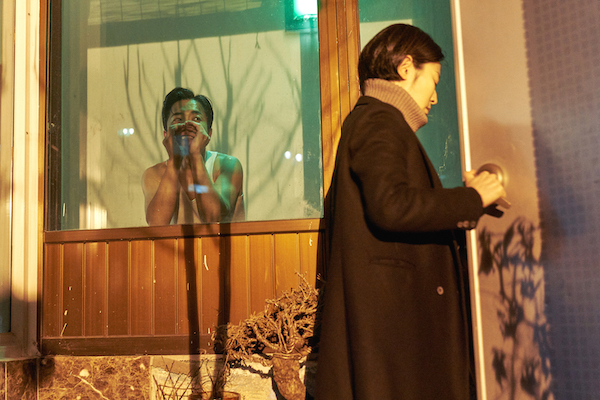
KIM YOUNG-MIN AND KANG MAL-GEUM IN LUCKY CHAN-SIL
Woman at a crossroads
At a drunken wrap-party, the director collapses and dies. Producer Lee Chan-sil (Kang Mal-geum), a middle-aged, never-married woman who has so long worked with him, finds herself out of a job and questioning her life. This is the premise of a new Korean film by a woman director, a collaborator of Hong Sang-soo (who has in fact herself co-produced eight of his films in the last decade), that's been seen as a riff off Hong or a lighthearted parody nodding at and perhaps chiding Hong's male point of view.
The reference to films and filmmakers and focus on one of the latter in difficulties come straight out of Hong Sang-soo. This certainly seems self-referential, and by indirection a reference to Hong. It's harder to detect a parodic, satirical, or comedic aspect referring to Hong or of any kind. This seems primarily a warm-hearted female professional midlife-crisis film, small and based on conversation like Hong, but more like a conventional film than like one of his. Pleasant and not very demanding (which might fit Hong, but his films are complexly self-referential by now), this has a bittersweet quality.
The constant presence of Granny (Yoon Yuh-jung), an old lady with philosophical observations from an end-of-life position, heightens the focus on self-reflection. Likewise a young man in underwear (Kim Young-min) who identifies himself as the ghost of Leslie Cheung, the Hong Kong megastar and regular of Wong Kar-wai films, who committed suicide in 2003. He serves as a quiet cheerleader and contributes to the meditative mood - and sense that Producer Lee is at the end of her tether.
She has gone to stay with an actress friend she calls Sis, Sophie (Yoon Seung-ah), does housekeeping for her, and helps Granny with her "homework." Granny can't read, it turns out, because in her day girls weren't allowed to learn because it would make them uppity - one more sign of Korea's deep misogynous bent whose current manifestation is shown in another 2020 NYAFF film, Kim Do-young's Kim Ji-young: Born 1982.
But the main self-realization comes through a would-be romance. Sophie has a man giving her French lessons, Young KIm (Bae Yu-ram) who's also an aspiring filmmaker. Producer Lee has some friendly conversations with Young Kim; both are single and have little to do, they share some meals, and Producer Lee gets ideas which eventually Young Kim sets straight. He thinks of her more like an older sister. A rude awakening for Producer Lee. But she has Granny and the ghost of Leslie Cheung to consult with. And when Producer Lee finds Young Kim found Ozu's Tokyo Story boring and prefers Christopher Nolan, she's relieved of her illusion they might be compatible. Only trouble is she's realizing now she's missed out on love by being work-driven and never entering into couple-hood. Granny warns her not to regret the past, to enjoy each day: you know the drill.
Yes, this does have a "transition from female sacrifice to female empowerment." Simply being a film about someone (formerly) involved in making films doesn't, however, make it a "smart metanarrative on the art of filmmaking," though the film may be a comment on the filmmaker's own life. It's a more conventional one than Hong Sang-soo's. It does have the one opening drunken scene, too short for Hong though; and Hong-like exterior scenes, perhaps duplicating actual locations he's used, though I can't be sure of that. I might have enjoyed it more had I not been asked to see complexities and cross-references I couldn't find.
Lucky chan-sil / 찬실이는 복도 많지("There are many corridors in the cold room"), 96 mins., debuted at Busan Oct. 2019, also showing at Seoul, Independent Film Festival, Osaka and Pyeongchang festivals in 2019 and 2020. It won Best Picture at Seoul and the CGV Arthouse Award, the KBS Independent Film Award, and the Director’s Guild of Korea Award. Screened for this review as part of the virtual 2020 New York Asian Film Festival (Aug. 28-Sept. 12).
Last edited by Chris Knipp; 09-06-2020 at 01:39 AM.
-
DANCING MARY ダンシング・マリ (Sabu 2019)
SABU: DANCING MARY ダンシング・マリ (2019)
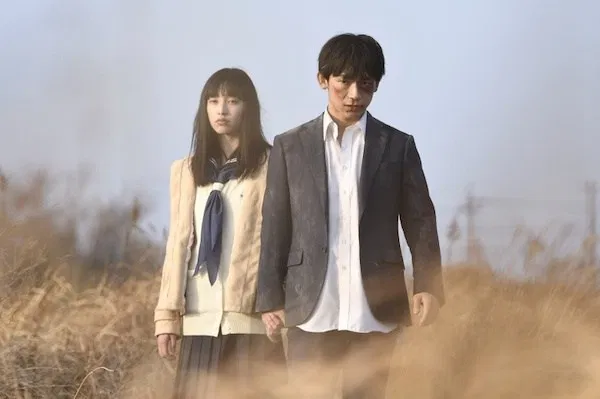
AINA YAMADA AND NAOTO IN DANCING MARY
Before remodeling, an exorcism is sometimes needed
Some of the scenes in this genre mashup are delightful, perhaps especially ones that have nothing essential to do with the plot. I liked when some young office drones finish an urgent conversation in the cafeteria and one says, "Good lunch!" And when the protagonist Kenji Fujimoto (dancer-rapper Kataoka Naoto, known as Naoto) is in a hospital for the spirit medium he's recruiting and two women with cancer in the ward mercilessly rag him for being a cowardly loser. It's not essential to the action, but the rhythm is great. The government agency for which the normally lazy Kenji works has put him in charge of a nightmare job - the demolition an old showa-era dance hall to be converted into a mall and offices. There's a serious snag: the ugly old building is haunted and people are afraid to go in. So the yakuza, the Japanese mafia, is called in as well as some ghosts who can help out. And Kenji, who never stops being comically frightened, enlists the medium he hears about (who's being bullied for it, by the way, the class "Carrie"), a high school girl called Yukiko ((Aina Yamada)). It doesn't hurt that to channel the ghost connection, Kenji has to hold hands with Yukiko all the time. A dancer called Mary (dancer model Bando Nozomi. haunts the building. (The involvement of Naoto and Bando Nozomi is due to a contract Sabu (Hiroyuki Tanaka) has signed with a talent agency.)
A plane ride take Kenji to an all-out battle of dead guys in limbo. An aim is for lost souls to be allowed to go to heaven (So: ghost story meets martial arts.) He and the medium go over with a slaughtered yakuza full of swords from "death by a thousand" - or a dozen anyway - cuts. They come back with the wild Johnny (Kaito Yoshimura), a scruffy, rambunctious ghost of a rocker Mary's lost boyfriend, who hopefully will free Mary of her entrapment in the dance hall building. Johnny is a laugh all the way. Notice his wild reaction to being in a plane; and his demands after landing, en route to see Mary - chewing gum and a boutique outfit - and his critique of the boring modern car - lots of fun, throwaway moments come with Johnny.
Jason Maher, whose review in VCinema elucidates details of the narrative that had eluded me, is one of several who note, in his case admiringly, that the style Sabu evokes here at times recalls the early Kiyoshi Kurosawa (Sabu acted in Kurosawa's 2001 Pulse). Maher notes that Sabu exchews "jump-scares and gore," and adopts (I liked this) a "texture" that is "damp and cold." Refreshing on a hot day! Maher describes the sensory atmosphere of the movie admirably : "Shrill strings, wailing winds and melancholy music are heard while cobwebbed corridors, abandoned abodes, decrepit danchis and the mouldy dance hall provide the settings." There are several supple ballet sequences too, by the way.Ghost-communication scenes are in black and white. Maybe it doesn't all hold together because there are so many disparate genre elements. But if you hang on for the ride, fun is to be had.
Dancing Mary ダンシング・マリ, 96 mins., released Japan Oct. 2019, Imagine Film Festival (Netherlands) Sept. 5, 2020. Screened for this review as part of the virtual 2020 New York Asian Film Festival.
Last edited by Chris Knipp; 09-07-2020 at 12:08 AM.
 Posting Permissions
Posting Permissions
- You may not post new threads
- You may not post replies
- You may not post attachments
- You may not edit your posts
-
Forum Rules





 Reply With Quote
Reply With Quote






Bookmarks